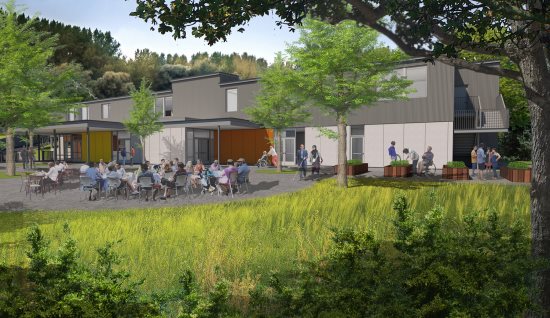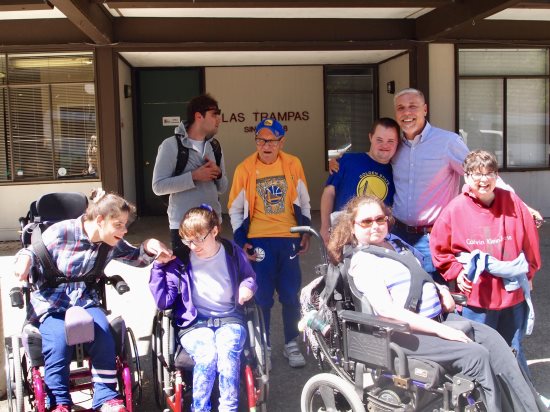
| ||||||
If walking into the current, dated building is like taking a step back to the 1960s, that's because, in fact, it is exactly that. The campus evolved and grew out of a 1958 ranch house serving children with severe disabilities. Currently Las Trampas serves the needs of 70 day participants aged 22 years and older with moderate to profound intellectual and developmental disabilities, with 15 in wheelchairs. Some live with caregivers, others in residential homes with 24-hour supervision, and others under supported and independent living services.
The building on the 2.5-acre lot on Lana Lane is inadequate on many levels, even beyond the visibly peeling paint and obvious disrepair. It is not ADA compliant. Doorways are narrow and difficult for wheelchairs. There is barely any space for the many buses that drop off each day. They are limited in the number of individuals they can accept and have a significant waitlist.
Despite all of this, the feeling in the place is one of joy. The philosophy is that all people with IDD are entitled to develop their optimum state of social, physical and mental well-being. Participants are integrated into the community, going out to work where possible. They work on campus too, at a shredding business, providing janitorial services, and making blankets for Children's Hospital Oakland. They go out bowling and to the gym. Integration in the community is a focus.
Capital Campaign Committee Member and former Development Director Kathy Merchant says, "I put myself in the shoes of the families we serve and realize not only does Las Trampas offer them respite from 24/7 caregiving Monday-Friday, but they know their family member is encouraged to explore a rich menu of activities on and off campus."
When the new $12.5 million phase-one, two-story construction is complete, anticipated in 18-24 months, Las Trampas will be able to offer a campus, unique in all of Northern California, serving 120 individuals, almost double the current capacity. The facility will be able to take 50 participants in wheelchairs.
"To my knowledge, this facility will be the only one of its kind that specifically addresses the environmental needs of people with intellectual and developmental disabilities, particularly those on the autism spectrum," says Executive Director Daniel Hogue.
Hogue explains that with diagnoses of autism on the rise, the new facility will accommodate special sensory needs of these individuals including acoustics, lighting, transitional spaces, and sensory areas.
Hallways will be wide enough to accommodate two wheelchair users and one walker, so that no one will be in the position of feeling "in the way" in their own community. There will be multiple garden spaces intentionally designed to calm or stimulate the five senses. There will be a teaching kitchen. Among the many features planned, Hogue is excited for a digital communications system that can accommodate evolving technologies.
"Since approximately 50% of the individuals served by Las Trampas have limited to no verbal communication skills, we are including features that will allow expansion of technology as a tool for learning," says Hogue. "This includes smart devices, assistive technologies, and augmentative and alternative communication systems."
The project will require moving everyone off campus. Currently, Hogue says, they are working on finalizing a deal to secure the temporary location space.
Hogue explains that with program closures occurring throughout the state and approximately 15,000 people being added to the California IDD system each year, the pressure is on to build sustainability and capacity to ensure entitlements established through the Lanterman Act - a law stating the rights and responsibilities of persons with developmental disabilities - are secure.
"Fortunately in the Lamorinda area, we have a community that understands the importance of leaving no one behind, including those with intellectual and developmental disabilities, despite state funding challenges," says Hogue. "With the support of our community, we are able to raise enough funds to start phase-one of our new campus - a campus designed specifically to meet the needs of people with intellectual and developmental disabilities, and particularly, those with autism."
Hogue explains that to fund a $12.5 million phase-one project, Las Trampas has had to utilize approximately $4 million from the sale of assets coupled with reserve funds and also incurred approximately $4 million in financing. "So, the need for additional fundraising is crucial to ensure Las Trampas' ongoing sustainability by reducing the need for $4 million worth of debt service."
Hogue is very grateful to Connie and Michael Collier who have together headed the capital campaign. Michael Collier, a retired architect himself, is also president of the board of directors and has been heavily involved along the way with the project. "Personally, I feel blessed to have been able to `find a meaningful place' at Las Trampas," he says, "where my professional experience can contribute to the realization of a new, state-of-the-art campus that will serve our fragile, under-served population for the next 50 years."
Once this phase is complete a second phase will add an approximate 10,000 square feet of administrative offices and additional classroom space. The public will have plenty of opportunity to see all details of the projects as excitement grows. Architectural renderings will be on display on the fence bordering the Lafayette-Moraga Trail.
Plans will also be available at the 10th Annual Walk n' Roll fundraiser (see story on page B5) on Sept. 28, and the public is invited to an "Old Facility Farewell" information evening with wine and hors d'oeuvres from 5 to 7 p.m. Oct. 8 for speaker presentations and a tour.
"Lafayette is very lucky to be the host city to such an amazing, caring, and well run program for some of the most vulnerable and ignored among us," says Collier.
To RSVP for the Old Facility Farewell Event, call (925) 284-1462.

Reach the reporter at:
